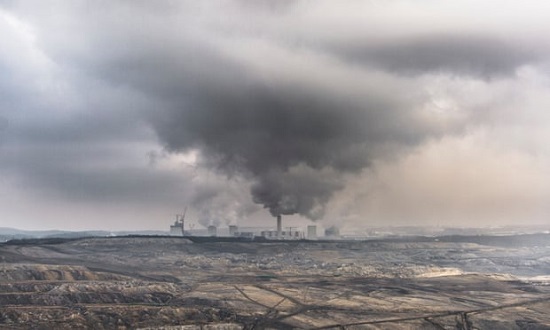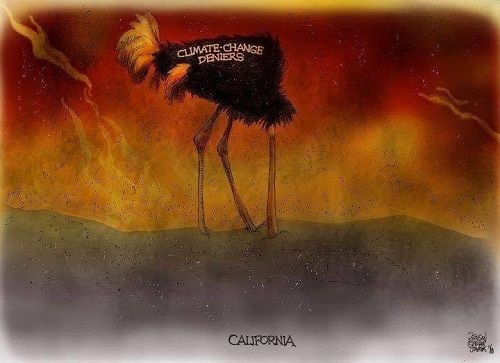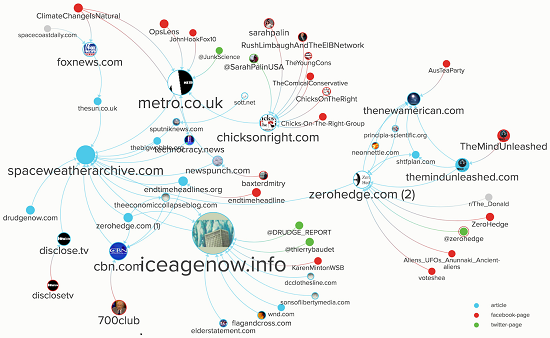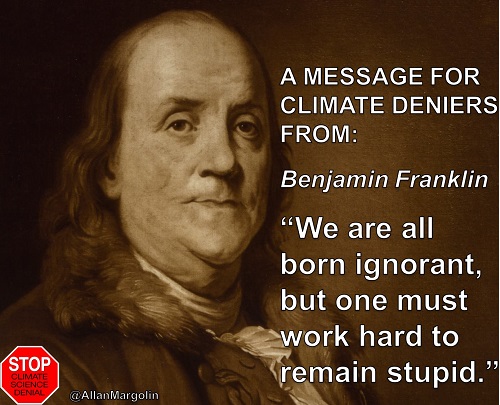Story of the Week... Toon of the Week... SkS in the News... Coming Soon on SkS... Climate Feedback Insights... SkS Week in Review... Poster of the Week...
Story of the Week...
Climate-heating greenhouse gases at record levels, says UN
Carbon dioxide, methane and nitrous oxide are far above pre-industrial levels

A power station in Poland close to the borders with Germany and the Czech Republic. Photograph: Florian Gaertner/Photothek/Getty Images
The main greenhouse gas emissions driving climate change have all reached record levels, the UN’s meteorology experts have reported.
Carbon dioxide, methane and nitrous oxide are now far above pre-industrial levels, with no sign of a reversal of the upward trend, a World Meteorological Organization report says.
“The last time the Earth experienced a comparable concentration of CO2 was 3-5m years ago, when the temperature was 2-3C warmer and sea level was 10-20 metres higher than now,” said the WMO secretary general, Petteri Taalas.
“The science is clear. Without rapid cuts in CO2 and other greenhouse gases, climate change will have increasingly destructive and irreversible impacts on life on Earth. The window of opportunity for action is almost closed.”
Levels of CO2 rose to a global average of 405.5 parts per million in the atmosphere in 2017 – almost 50% higher than before the industrial revolution.
Levels of methane, a potent greenhouse gas responsible for about 17% of global warming are now 2.5 times higher than pre-industrial times owing to emissions from cattle, rice paddies and leaks from oil and gas wells.
Nitrous oxide, which also warms the planet and destroys the Earth’s protective ozone layer, is now over 20% higher than pre-industrial levels. About 40% of N2O comes from human activities including soil degradation, fertiliser use and industry.
Climate-heating greenhouse gases at record levels, says UN by Damian Carrington, Environment, Guardian, Nov 22, 2018
Toon of the Week...

SkS in the News
The origins of Skeptical Science and its rebuttals to the top 10 climate myth are the focus of the MNPR News article, How to talk climate change with skeptical relatives during the holidays by Cody Nelson & Paul Huttner.
In his New York Times article, It’s Cold Outside? Gather Around the Turkey and Argue About Climate Change, John Schwartz refers reader to Skeptical Science in the following paragraph:
If you must rebut, take a deep breath and excuse yourself for research. With the internet on our phones, a quick trip to the bathroom is like visiting the library, and sites like Skeptical Science and the denial response collection at Grist can be helpful.
Coming Soon on SkS...
- Discussing climate change on the net (Baerbel)
- Why does CO2 cause the Greenhouse Effect?! (Adam Levy)
- New findings on ocean warming: 5 questions answered (Scott Denning)
- Global coal use may have peaked in 2014, says latest IEA World Energy Outlook (Simon Evans)
- New research this week (Ari)
- 2018 SkS Weekly Climate Change & Global Warming News Roundup #48 (John Hartz)
- 2018 SkS Weekly Climate Change & Global Warming Weekly Digest #48 (John Hartz)
Climate Feedback Insights...
False claims of a coming ice age spread through ecosystem of unreliable news sites, blogs, and social media accounts

Figure – The network of outlets, blogs, and social media profiles who have shared and endorsed the claim that an imminent “mini ice age” would be coming based on a misinterpretation of the original article at Space Weather Archive. Dot sizes are proportional to the total number of shares and interactions on social media; arrows represent citations from an article/social media profile to its source.
Solar Minimum expected to cool the upper-atmosphere
Recently, a claim that we are heading towards a mini ice age has been popping up across the web. This was the subject of a widely discussed Metro article titled “A mini ice age could be on the way which means it will get very, very cold”. Similar claims that we would be heading towards an imminent “mini ice age” were also repeated without verification throughout a network of unreliable outlets for climate news including Sputnik, The Sun, Fox News, and numerous hyper-partisan blogs such as Zero Hedge, Principia Scientific, IceAgeNow, Alien-Star… (listed in the table below).
The stories claim to be based on a September 27th article at Space Weather Archive, in which NASA scientist Martin Mlynczak discusses the influence of current low solar activity on the Earth’s thermosphere—a layer of the atmosphere that begins about 65 miles above the surface. Mlynczak explained to Climate Feedback that headline claims of coming cold weather are “false”:
There is no relationship between the natural cycle of cooling and warming in the thermosphere and the weather/climate at Earth’s surface. NASA and other climate researchers continue to see a warming trend in the troposphere, the layer of atmosphere closest to Earth’s surface.
Update (22 Nov. 2018):
The Metro article has been updated following publication of our review. The author completely changed the title and the main claim of the article, making it clear that no mini ice age would be imminent. Read the details in our claim review: “Metro’s claims of coming “mini ice age” have no basis in reality
Update (23 Nov. 2018):
The Sun article has also been updated to clarify that the low temperatures would not influence the Earth’s climate. See details here.
False claims of a coming ice age spread through ecosystem of unreliable news sites, blogs, and social media accounts by Emmanuel M Vincent, Insights, Climate Feedback, Nov 21, 2018
SkS Week in Review...
- 2018 SkS Weekly Climate Change & Global Warming News Roundup #47 by John Hartz
- New research, November 12-18, 2018 by Ari Jokimäki
- Did bombing during second world war cool global temperatures? by Alan Robock (Carbon Brief)
- The Scientific Consensus on Climate Change by Sarah Finnie Robinson (Boston University Institute for Sustainable Energy)
- 2018 SkS Weekly Climate Change & Global Warming Digest #46 by John Hartz
Poster of the Week...

from Skeptical Science https://ift.tt/2PXnDMJ
Story of the Week... Toon of the Week... SkS in the News... Coming Soon on SkS... Climate Feedback Insights... SkS Week in Review... Poster of the Week...
Story of the Week...
Climate-heating greenhouse gases at record levels, says UN
Carbon dioxide, methane and nitrous oxide are far above pre-industrial levels

A power station in Poland close to the borders with Germany and the Czech Republic. Photograph: Florian Gaertner/Photothek/Getty Images
The main greenhouse gas emissions driving climate change have all reached record levels, the UN’s meteorology experts have reported.
Carbon dioxide, methane and nitrous oxide are now far above pre-industrial levels, with no sign of a reversal of the upward trend, a World Meteorological Organization report says.
“The last time the Earth experienced a comparable concentration of CO2 was 3-5m years ago, when the temperature was 2-3C warmer and sea level was 10-20 metres higher than now,” said the WMO secretary general, Petteri Taalas.
“The science is clear. Without rapid cuts in CO2 and other greenhouse gases, climate change will have increasingly destructive and irreversible impacts on life on Earth. The window of opportunity for action is almost closed.”
Levels of CO2 rose to a global average of 405.5 parts per million in the atmosphere in 2017 – almost 50% higher than before the industrial revolution.
Levels of methane, a potent greenhouse gas responsible for about 17% of global warming are now 2.5 times higher than pre-industrial times owing to emissions from cattle, rice paddies and leaks from oil and gas wells.
Nitrous oxide, which also warms the planet and destroys the Earth’s protective ozone layer, is now over 20% higher than pre-industrial levels. About 40% of N2O comes from human activities including soil degradation, fertiliser use and industry.
Climate-heating greenhouse gases at record levels, says UN by Damian Carrington, Environment, Guardian, Nov 22, 2018
Toon of the Week...

SkS in the News
The origins of Skeptical Science and its rebuttals to the top 10 climate myth are the focus of the MNPR News article, How to talk climate change with skeptical relatives during the holidays by Cody Nelson & Paul Huttner.
In his New York Times article, It’s Cold Outside? Gather Around the Turkey and Argue About Climate Change, John Schwartz refers reader to Skeptical Science in the following paragraph:
If you must rebut, take a deep breath and excuse yourself for research. With the internet on our phones, a quick trip to the bathroom is like visiting the library, and sites like Skeptical Science and the denial response collection at Grist can be helpful.
Coming Soon on SkS...
- Discussing climate change on the net (Baerbel)
- Why does CO2 cause the Greenhouse Effect?! (Adam Levy)
- New findings on ocean warming: 5 questions answered (Scott Denning)
- Global coal use may have peaked in 2014, says latest IEA World Energy Outlook (Simon Evans)
- New research this week (Ari)
- 2018 SkS Weekly Climate Change & Global Warming News Roundup #48 (John Hartz)
- 2018 SkS Weekly Climate Change & Global Warming Weekly Digest #48 (John Hartz)
Climate Feedback Insights...
False claims of a coming ice age spread through ecosystem of unreliable news sites, blogs, and social media accounts

Figure – The network of outlets, blogs, and social media profiles who have shared and endorsed the claim that an imminent “mini ice age” would be coming based on a misinterpretation of the original article at Space Weather Archive. Dot sizes are proportional to the total number of shares and interactions on social media; arrows represent citations from an article/social media profile to its source.
Solar Minimum expected to cool the upper-atmosphere
Recently, a claim that we are heading towards a mini ice age has been popping up across the web. This was the subject of a widely discussed Metro article titled “A mini ice age could be on the way which means it will get very, very cold”. Similar claims that we would be heading towards an imminent “mini ice age” were also repeated without verification throughout a network of unreliable outlets for climate news including Sputnik, The Sun, Fox News, and numerous hyper-partisan blogs such as Zero Hedge, Principia Scientific, IceAgeNow, Alien-Star… (listed in the table below).
The stories claim to be based on a September 27th article at Space Weather Archive, in which NASA scientist Martin Mlynczak discusses the influence of current low solar activity on the Earth’s thermosphere—a layer of the atmosphere that begins about 65 miles above the surface. Mlynczak explained to Climate Feedback that headline claims of coming cold weather are “false”:
There is no relationship between the natural cycle of cooling and warming in the thermosphere and the weather/climate at Earth’s surface. NASA and other climate researchers continue to see a warming trend in the troposphere, the layer of atmosphere closest to Earth’s surface.
Update (22 Nov. 2018):
The Metro article has been updated following publication of our review. The author completely changed the title and the main claim of the article, making it clear that no mini ice age would be imminent. Read the details in our claim review: “Metro’s claims of coming “mini ice age” have no basis in reality
Update (23 Nov. 2018):
The Sun article has also been updated to clarify that the low temperatures would not influence the Earth’s climate. See details here.
False claims of a coming ice age spread through ecosystem of unreliable news sites, blogs, and social media accounts by Emmanuel M Vincent, Insights, Climate Feedback, Nov 21, 2018
SkS Week in Review...
- 2018 SkS Weekly Climate Change & Global Warming News Roundup #47 by John Hartz
- New research, November 12-18, 2018 by Ari Jokimäki
- Did bombing during second world war cool global temperatures? by Alan Robock (Carbon Brief)
- The Scientific Consensus on Climate Change by Sarah Finnie Robinson (Boston University Institute for Sustainable Energy)
- 2018 SkS Weekly Climate Change & Global Warming Digest #46 by John Hartz
Poster of the Week...

from Skeptical Science https://ift.tt/2PXnDMJ

Aucun commentaire:
Enregistrer un commentaire